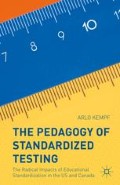Abstract
In 2004, leading testing expert Robert L. Brennan1 explained: “I failed to recognize that a testing revolution was underway in this country that was based on the nearly unchallenged belief (with almost no supporting evidence) that high-stakes testing can and will lead to improved education.”2 Despite such cautions from mainstream assessment and measurement scholars, the current frequency and use of standardized testing is unprecedented in US history. In Canada, despite significant variation across its provinces and territories, norm-referenced standardized testing (ST) has scarcely been as widely used as it is today. To be clear, testing is not the only important development underway in education. Despite a push against social foundations in education3 in some teacher preparation programs, teacher training is generally more comprehensive than it used to be. New teachers are better versed in supporting diverse students, they have access to a greater variety of instruction and assessment techniques and they have a deeper applied understanding of education research and technology than many of their predecessors. However, while testing is not the only driver of change, it is the most significant. Standardized testing is best understood as a technology, the nature and effects of which can be read a number of ways.
Access this chapter
Tax calculation will be finalised at checkout
Purchases are for personal use only
Preview
Unable to display preview. Download preview PDF.
Notes
Andrew Feenberg, Critical Theory of Technology (New York: Oxford, 1991), 12.
Melissa Lazaĺrn, Testing Overload in America’s Schools (Washington, DC: Center for American Progress, 2014), 2.
Howard Nelson, Testing More, Teaching Less, What America’s Obsession with Student Testing Costs in Money and Lost Instructional Time (Washington, DC: American Federation of Teachers, 2013), 6–7.
Diane Ravitch, Reign of Error: The Hoax of the Privatization Movement and the Danger to America’s Public Schools (New York: Knopf, 2013), 12.
Howard Nelson, Testing More, Teaching Less, What America’s Obsession with Student Testing Costs in Money and Lost Instructional Time (Washington, DC: American Federation of Teachers, 2013), 6–7.
Matthew M. Chingos, Strength in Numbers: State Spending on K-12 Assessment Systems (Washington, DC: Brown Center on Education Policy at Brookings, 2012), 1–2.
Linda Darling-Hammond and Frank Adamson. “Developing Assessments of Deeper Learning: The Costs and Benefits of Using Tests that Help Students Learn” (Stanford, CA: Stanford Center for Opportunity Policy in Education, 2013).
Matthew M. Chingos, Strength in Numbers: State Spending on K-12 Assessment Systems (Washington, DC: Brown Center on Education Policy at Brookings, 2012), 10.
Matthew M. Chingos, Strength in Numbers: State Spending on K-12 Assessment Systems (Washington, DC: Brown Center on Education Policy at Brookings, 2012), 10.
Matthew M. Chingos, Strength in Numbers: State Spending on K-12 Assessment Systems (Washington, DC: Brown Center on Education Policy at Brookings, 2012), 2.
Matthew M. Chingos, Strength in Numbers: State Spending on K-12 Assessment Systems (Washington, DC: Brown Center on Education Policy at Brookings, 2012), 2.
Barry Topol, John Olson, and Ed Roeber. The Cost of New Higher Quality Assessments: A Comprehensive Analysis of the Potential Costs for Future State Assessments (Stanford, CA: Stanford Center for Opportunity Policy in Education, 2010).
Iris C. Rotberg, “Assessment Around the World,” Educational Measurement 54 (2006): 4.
Iris C. Rotberg, “Assessment Around the World,” Educational Measurement 54 (2006): 4.
Organization for Economic Cooperation and Development, Reviews of National Policies for Education: Improving Lower Secondary Schools in Norway (Paris: OECD, 2011), 9.
Organization for Economic Cooperation and Development. PISA 2012 Results: What Makes Schools Successful? Resources, Policies and Practices Volume 4 (Paris: OECD Publishing, 2013), 147.
Organization for Economic Cooperation and Development. PISA 2012 Results: What Makes Schools Successful? Resources, Policies and Practices Volume 4 (Paris: OECD Publishing, 2013). 147.
Organization for Economic Cooperation and Development. PISA 2012 Results: What Makes Schools Successful? Resources, Policies and Practices Volume 4 (Paris: OECD Publishing, 2013), 148.
Organization for Economic Cooperation and Development. PISA 2012 Results: What Makes Schools Successful? Resources, Policies and Practices Volume 4 (Paris: OECD Publishing, 2013), 148.
Adapted from: Organization for Economic development and Cooperation. PISA 2012 Results: What Makes Schools Successful? Resources, Policies and Practices Volume 4 (Paris: OECD Publishing, 2013), 148.
Chicagoland Researchers and Advocates for Transformative Education. Research Brief 1: Testing Today in Context: History, Impact, and Alternatives (Chicago: CReATE, 2012), 4, accessed January 10, 2014, http://www.createchicaeo.ore/.
James Popham, Classroom Assessment: What Teachers Need to Know (Boston, MA: Pearson, 2011), 83.
Alfie Kohn, “Fighting the Tests: A practical guide to Rescuing our Schools,” Phi Delta Kappan 82, no. 5 (2001): 349–357.
Doug Hart, “The 18th OISE Survey of Educational Issues: Public Attitudes Toward Education in Ontario 2012” (Toronto: The Ontario Institute for Studies in Education of the University of Toronto, 2012), 8.
Richard Wilkinson and Kate Pickett, The Spirit Level: Why Equality is Better for Everyone (London: Penguin, 2010).
Andy Hargreaves and Dennis Shirley, The Fourth Way: The Inspiring Future for Educational Change (Thousand Oaks, CA: Corwin Press, 2009), 62.
Marshall McLuhan, Understanding Media: The Extensions of Man (Boston: MIT Press, 2013), xxi.
Copyright information
© 2016 Arlo Kempf
About this chapter
Cite this chapter
Kempf, A. (2016). The School as Factory Farm: All Testing All the Time. In: The Pedagogy of Standardized Testing. Palgrave Macmillan, New York. https://doi.org/10.1057/9781137486653_2
Download citation
DOI: https://doi.org/10.1057/9781137486653_2
Publisher Name: Palgrave Macmillan, New York
Print ISBN: 978-1-349-57713-2
Online ISBN: 978-1-137-48665-3
eBook Packages: EducationEducation (R0)

